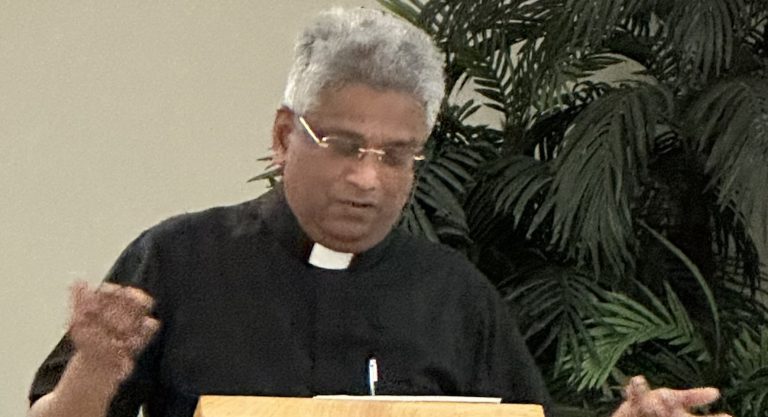SIXTH SUNDAY IN ORDINARY TIME – FEBRUARY 16, 2025
First Reading • Jeremiah 17.5-8
Psalm 1
Second Reading • 1 Corinthians 15.12, 16-20
Gospel • Luke 6.17, 20-26
Homily
This past December, China’s oldest priest passed away at 104 years of age. Fr. Joseph Guo Fude was ordained a priest in 1947, just before the Communist Party took over rule of the country. It was a time of brutal repression of the Church, and as a Catholic priest, Fr Fude was a target.
During the time he served as a priest, he was imprisoned three separate times in 1959, 1967, and 1982, and spent a total of 25 years of his priesthood in prison. The persecution by the Chinese government only strengthened Fr. Fude in his faith. At his 100th birthday, he said: “My imprisonment gave me the strength to face life’s challenges and continue to serve God, knowing that every trial was part of his divine plan. My experience in prison taught me that earthly riches are passing, while faith in God is the only true wealth.”
Because of his faithful service to God’s Church, Fr. Fude is a model of what Jesus teaches in today’s gospel. He is a priest who found the blessing in being poor, being hungry, in weeping, and in being hated by others. Though it might sound ironic, Fr. Fude found freedom in prison – the freedom to serve God even under the harshest conditions. In doing so, he inspired all those who knew him to do the same.
In today’s Gospel, Jesus gives us Luke’s version of the Beatitudes, sometimes called the Sermon on the Plain.
Unlike Matthew’s account, which has eight blessings, Luke presents four blessings and four woes, creating a contrast between those who seek God’s Kingdom and those who put their trust in the things of this world. While Matthew speaks of “Blessed are the poor in spirit,” Luke speaks directly to the poor, the hungry, the weeping, and the hated.
Jesus’ words challenge everything we believe about success and happiness. The world tells us that wealth, comfort and popularity are signs of a good life. But Jesus declares that God’s kingdom operates by a different set of values – not based on material riches, but on dependence on God.
“Blessed are you who are poor, for yours is the kingdom of God.”
This doesn’t mean poverty itself is good, but that those who recognize their need for God are truly blessed. When we lack material wealth, we often turn to God more easily, trusting His providence.
“Blessed are you who are hungry now, for you will be filled.”
Jesus is not just talking about physical hunger but about those who hunger for justice, righteousness, and God’s presence. If we desire God above all things, He will fill our hearts with true joy.
“Blessed are you who weep now, for you will laugh.”
We all experience suffering, but those who trust in God find hope even in pain. Jesus promises that our tears will be turned into joy in His kingdom.
“Blessed are you when people hate you on account of the Son of Man.”
Following Christ isn’t always easy. The world may mock our faith, but Jesus tells us that suffering for His sake is actually a cause for rejoicing because it means we are walking in the footsteps of the prophets.
Jesus follows the blessings with a series of warnings.
“Woe to you who are rich…who are full…who laugh now…who are spoken well of.”
These are not automatic condemnations, but they serve as a wake-up call. Wealth, comfort, and human approval can become obstacles if they lead us to trust in ourselves rather than in God.
Jesus is asking us: Where do we put our trust? If we rely only on wealth, power, and worldly happiness, we may have temporary satisfaction, but we risk missing out on eternal joy. If, however, we rely on God- seeking His will, loving the poor, trusting Him in suffering- we will inherit the Kingdom of God.
This Gospel is not just about rich vs. poor, but about the attitude of the heart. Are we humble enough to recognize our need for God? Are we willing to follow Jesus even when it costs us?
Faithfulness to Christ often comes with challenges as Fr. Fude faced in China. Yet, Jesus assures us that suffering for His sake brings eternal reward.
The Beatitudes are not just ideals but a way of life. They challenge us to live differently – trusting in God’s grace rather than worldly success. In our daily lives, we are called to be merciful, to seek justice, to be peacemakers, and to remain faithful even in difficulties.
The Beatitudes teach us that happiness is not found in riches or comfort but in a life centred on God. They invite us to trust in His promises, to embrace His ways, and to live as true disciples of Christ.
God’s desire for us is freedom. He wants us to be free to put His will at the centre of our lives.
To be free means no longer being possessed by what we own, no longer following our stomachs rather than our souls, no longer ignoring the sadness all around us, and no longer living for others but for God alone.
That is what Fr. Joseph Fude discovered. That is what Jesus offers each of us who choose to follow Him in freedom.

